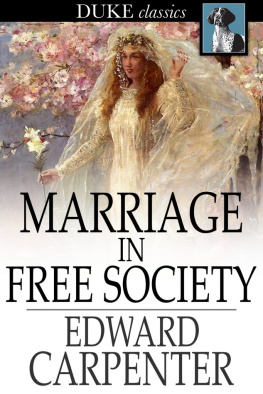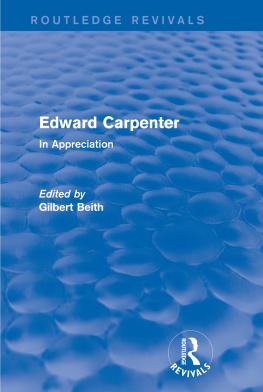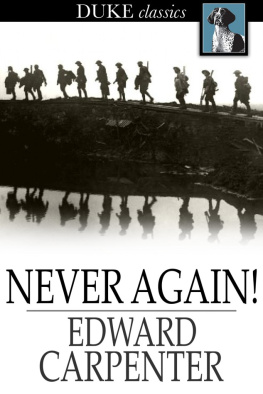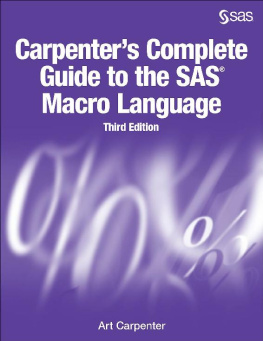BY EDWARD CARPENTER.
PRICE FOURPENCE.
MANCHESTER:
The Labour Press Society Limited, Printers and Publishers
1894.
SEX-LOVE
The subject of Sex is most difficult to deal with, not only on account of a certain prudery as well as a natural reticence on the subject, but doubtless also because the passion itself being so tremendously strong and occupying such a large part of human thoughtand words being so scanty and inadequate on the subjecteverything that is said is liable to be misunderstood; the most violent inferences are made, and equivocations surmised, from the simplest remarks; qualified admissions of liberty are interpreted into recommendations of unbridled licence; and generally the perspective of literary expression is turned upside down by the effect of the unfamiliarity of the topic on the reader's mind.
There is indeed a vast deal of fetishism in the current treatment of Sex; and the subject is dealt with as though it lay quite out of line with any other need or faculty of human nature. Nor can one altogether be surprised at this when one perceives of what vast import Sex is in the scheme of things, and how deeply it it has been associated since the earliest times not only with man's personal impulses but even with his religious sentiments and ceremonials.
Next to hunger this is doubtless the most primitive and imperative of our needs. But in modern civilised life Sex enters probably even more into consciousness than hunger. For the hunger-needs of the human race are in the later societies fairly well satisfied, but the sex-desires are strongly restrained, both by law and custom, from satisfactionand so assert themselves all the more in thought.
To find the place of these desires, their utterance, their control, their personal import, their social import, is a tremendous problem to every youth and girl, man and woman.
There are a few of both sexes, doubtless, who hardly feel the passionwho have never been "in love," and who experience no strong sexual appetitebut these are rare. Practically the passion is a matter of universal experience; and speaking broadly and generally we may say it is a matter on which it is quite desirable that every adult at some time or other should have experienceactual and physical, as well as emotional. There may be exceptions; but, as said, the sex-instinct lies so deep and is so universal, that for the understanding of lifeof one's own life, of that of others, and of human nature in generalas well as for the proper development of one's own capacities, such experience is almost indispensable.
And here in passing I would say that in the social life of the future this need will surely be recognised, and not only will young people be deliberately prepared and instructed for the fulfilment of Sex when their time comes, but (while there will be no stigma attaching to voluntary celibacy) the state of enforced celibacy in which vast numbers of women live to-day will be looked upon as a national wrong, almost as grievous as that of prostitutionof which latter evil indeed it is in some degree the counterpart or necessary accompaniment.
Of course Nature (personifying under this term the more unconscious, even though human, instincts and forces) takes pretty good care in her own way that most people should have sexual experience. She has her own purposes to work out, which in a sense have nothing to do with the individualher racial purposes. But she acts in the rough, with tremendous sweep and power, and with little adjustment to or consideration for the later developed and more conscious and intelligent ideals of humanity. The youth, deeply infected with the sex-passion, suddenly finds himself in the presence of Titanic forcesthe Titanic but sub-conscious forces of his own nature. "In love" he feels a superhuman strengthand rightly so, for he identifies himself with cosmic energies and entities, powers that are preparing the future of the race, and whose operations extend over vast regions of space and millennial lapses of time. He sees into the abysmal deeps of his own being, and trembles with a kind of awe at the disclosure. And what he feels concerning himself he feels similarly concerning the one who has inspired his passion. The glances of the two lovers penetrate far beyond the surface, ages down into each other, waking a myriad antenatal dreams.
For the moment he lets himself go, rejoicing in the sense of limitless power beneath himborne onwards like a man down rapids, too intoxicated with the glory of motion to think of whither he is going; then the next moment he discovers that he is being hurried into impossible situationssituations which his own moral conscience, as well as the moral conscience of Society, embodied in law and custom, will not admit. He finds perhaps that the satisfaction of his imperious impulse is, to all appearances, inconsistent with the welfare of her he loves. His own passion arises before him as a kind of rude giant which he or the race to which he belongs may, Frankenstein-like, have created ages back, but which he now has to dominate or be dominated by; and there declares itself in him the fiercest conflictthat between his far-back Titanic instinctive and sub-conscious nature, and his later developed, more especially human and moral self.
While the glory of Sex pervades and suffuses all Nature; while the flowers are rayed and starred out towards the sun in the very ecstasy of generation; while the nostrils of the animals dilate, and their forms become instinct, under the passion, with a proud and fiery beauty; while even the human lover is transformed, and in the great splendors of the mountains and the sky perceives something to which he had not the key beforeyet it is curious that just here, in Man, we find the magic wand of Nature suddenly broken, and doubt and conflict and division entering in, where a kind of unconscious harmony had first prevailed.
Heine I think says somewhere that the man who loves unsuccessfully knows himself to be a god. It is not perhaps till the great current of sexual love is checked and brought into conflict with the other parts of his being that the whole nature of the man, sexual and moral, under the tremendous stress rises into consciousness and reveals in fire its god-like quality. This is the work of the artificer who makes immortal soulswho out of the natural love evolves even a more perfect love. "In tutti gli amanti," says Giordano Bruno, " questo fabro vulcano" ("in all lovers is this Olympian blacksmith present").
It is the subject of this conflict, or at least differentiation, between the sexual and the more purely moral and social instincts in man which interests us here. It is clear, I think, that if sex is to be treated rationally, that is, neither superstitiously on the one hand nor licentiously on the other, we must be willing to admit that both the satisfaction of the passion and the non-satisfaction of it are desirable and beautiful. They both have their results, and man has to reap the fruits which belong to both experiences. May we not say that there is probably some sort of transmutation of essences continually effected and effectible in the human frame? Lust and Lovethe Aphrodite Pandemos and the Aphrodite Ouraniosare subtly interchangeable. Perhaps the corporeal amatory instinct and the ethereal human yearning for personal union are really and in essence one thing, with diverse forms of manifestation. However that may be, it is pretty evident that there is some deep relationship between them. It is a matter of common experience that the unrestrained outlet of merely physical desire leaves the nature drained of its higher love-forces; while on the other hand if the physical satisfaction be denied the body becomes surcharged with waves of emotionsometimes to an unhealthy and dangerous degree. Yet at times this emotional love may, by reason of its expression being checked or restricted, transform itself into the all-penetrating subtle influence of spiritual love.









